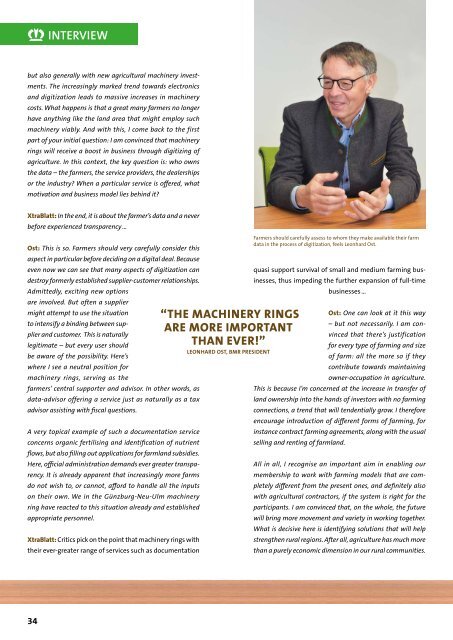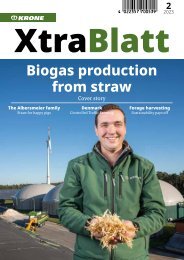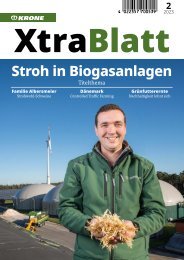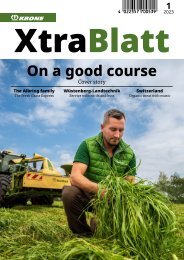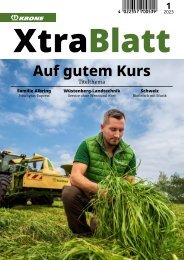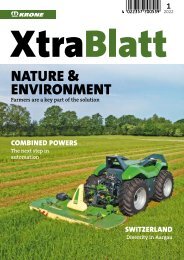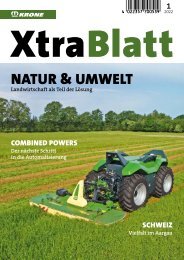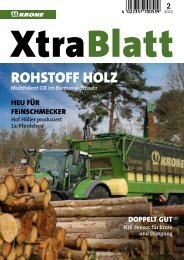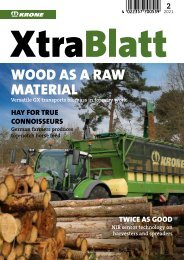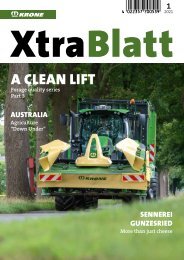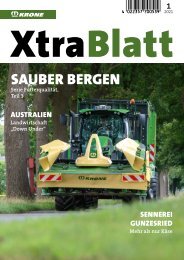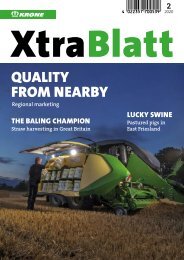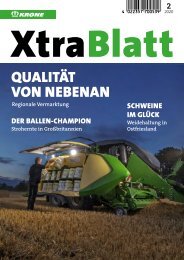XtraBlatt Issue 01-2019
Create successful ePaper yourself
Turn your PDF publications into a flip-book with our unique Google optimized e-Paper software.
INTERVIEW<br />
but also generally with new agricultural machinery investments.<br />
The increasingly marked trend towards electronics<br />
and digitization leads to massive increases in machinery<br />
costs. What happens is that a great many farmers no longer<br />
have anything like the land area that might employ such<br />
machinery viably. And with this, I come back to the first<br />
part of your initial question: I am convinced that machinery<br />
rings will receive a boost in business through digitizing of<br />
agriculture. In this context, the key question is: who owns<br />
the data – the farmers, the service providers, the dealerships<br />
or the industry? When a particular service is offered, what<br />
motivation and business model lies behind it?<br />
<strong>XtraBlatt</strong>: In the end, it is about the farmer’s data and a never<br />
before experienced transparency …<br />
Ost: This is so. Farmers should very carefully consider this<br />
aspect in particular before deciding on a digital deal. Because<br />
even now we can see that many aspects of digitization can<br />
destroy formerly established supplier-customer relationships.<br />
Admittedly, exciting new options<br />
are involved. But often a supplier<br />
might attempt to use the situation<br />
to intensify a binding between supplier<br />
and customer. This is naturally<br />
legitimate – but every user should<br />
be aware of the possibility. Here’s<br />
where I see a neutral position for<br />
machinery rings, serving as the<br />
farmers’ central supporter and advisor. In other words, as<br />
data-advisor offering a service just as naturally as a tax<br />
advisor assisting with fiscal questions.<br />
A very topical example of such a documentation service<br />
concerns organic fertilising and identification of nutrient<br />
flows, but also filling out applications for farmland subsidies.<br />
Here, official administration demands ever greater transparency.<br />
It is already apparent that increasingly more farms<br />
do not wish to, or cannot, afford to handle all the inputs<br />
on their own. We in the Günzburg-Neu-Ulm machinery<br />
ring have reacted to this situation already and established<br />
appropriate personnel.<br />
<strong>XtraBlatt</strong>: Critics pick on the point that machinery rings with<br />
their ever-greater range of services such as documentation<br />
“THE MACHINERY RINGS<br />
ARE MORE IMPORTANT<br />
THAN EVER!”<br />
LEONHARD OST, BMR PRESIDENT<br />
Farmers should carefully assess to whom they make available their farm<br />
data in the process of digitization, feels Leonhard Ost.<br />
quasi support survival of small and medium farming businesses,<br />
thus impeding the further expansion of full-time<br />
businesses …<br />
Ost: One can look at it this way<br />
– but not necessarily. I am convinced<br />
that there’s justification<br />
for every type of farming and size<br />
of farm: all the more so if they<br />
contribute towards maintaining<br />
owner-occupation in agriculture.<br />
This is because I’m concerned at the increase in transfer of<br />
land ownership into the hands of investors with no farming<br />
connections, a trend that will tendentially grow. I therefore<br />
encourage introduction of different forms of farming, for<br />
instance contract farming agreements, along with the usual<br />
selling and renting of farmland.<br />
All in all, I recognise an important aim in enabling our<br />
membership to work with farming models that are completely<br />
different from the present ones, and definitely also<br />
with agricultural contractors, if the system is right for the<br />
participants. I am convinced that, on the whole, the future<br />
will bring more movement and variety in working together.<br />
What is decisive here is identifying solutions that will help<br />
strengthen rural regions. After all, agriculture has much more<br />
than a purely economic dimension in our rural communities.<br />
<strong>XtraBlatt</strong>: But also…?<br />
Ost: … a definite social component. The drift of particularly<br />
younger people into population centres is already a massive<br />
problem nowadays. This also directly affects us as machinery<br />
rings, as it does agricultural contractors, trades and other<br />
classic family firms in rural areas. Let’s take the example<br />
of farm emergency relief services, one of our core tasks. Up<br />
until now, our relief workers came from the lines of young<br />
women and men waiting, sometime in the future, to take<br />
over the family farm and therefore<br />
still having enough time before the<br />
senior finally hands over the reins.<br />
But particularly on the growing<br />
number of full-time farms the<br />
volume of work means that, after<br />
training and/or studies, youngsters<br />
are needed at home; therefore are<br />
not available for the rings.<br />
On the other hand, those whose farm businesses are too small<br />
for full-time occupation, increasingly seek income alternatives<br />
in the agricultural periphery. Additionally, the children of such<br />
people primarily look for careers in completely different sectors<br />
and move into urban population centres If we, therefore,<br />
want to continue fulfilling our role as rings; supplying skilled<br />
personnel to meet demand, we have to establish more<br />
permanent full-time personnel. The only way that<br />
we can keep people here on the land is through<br />
providing enough suitable job opportunities. In<br />
this context I believe that we as machinery rings<br />
have a growing social responsibility.<br />
<strong>XtraBlatt</strong>: Through continuous expansion in the<br />
range of services offered, machinery rings may be<br />
also seen nowadays as competitors<br />
for contracts such as supplying<br />
skilled labour for gardening<br />
and landscaping, winter<br />
community services or municipal<br />
work, a role accompanied<br />
by comparatively<br />
aggressive bidding for<br />
any jobs going …<br />
“AGRICULTURE HAS MUCH<br />
MORE THAN A PURELY<br />
ECONOMIC DIMENSION IN<br />
OUR RURAL COMMUNITIES.”<br />
LEONHARD OST, BMR PRESIDENT<br />
Ost: To me such criticism is too general and, anyway, not even<br />
correct! In that we are working with permanent full-time<br />
personnel we are subject to the same costs as others offering<br />
respective services. Particularly because of the high work<br />
quality we provide, this doesn’t come at cut-rate prices.<br />
And, by the way, it is my experience that when the quality<br />
is right, the customer, for instance the farmer, is very happy<br />
to pay the required price. On the other hand, the rings must<br />
aim to secure sufficient work so that their teams remain<br />
profitable. Therefore they have to invest in attracting orders.<br />
This always represents negotiating<br />
a knife edge. In end effect, machinery<br />
rings, agricultural contractors,<br />
public services, trades and other<br />
commercial businesses all compete<br />
on an equal basis for good workers<br />
in rural areas. This has to do with<br />
wages, but equally with work<br />
conditions. In this respect, we are<br />
investing a lot in being attractive employers.<br />
<strong>XtraBlatt</strong>: Herr Ost, thank you for the discussion. «<br />
The president sees a future role of<br />
machinery rings as neutral data<br />
advisors whose service in this<br />
respect is just as naturally taken<br />
up as is the contribution of a tax<br />
adviser in taxation matters.<br />
34 35


